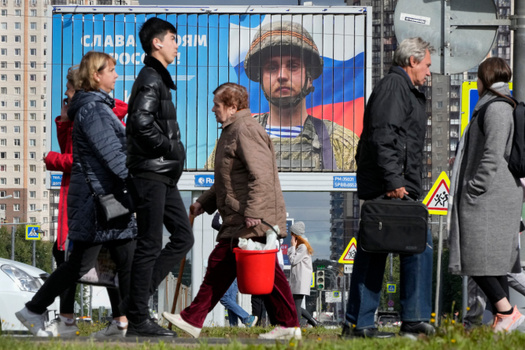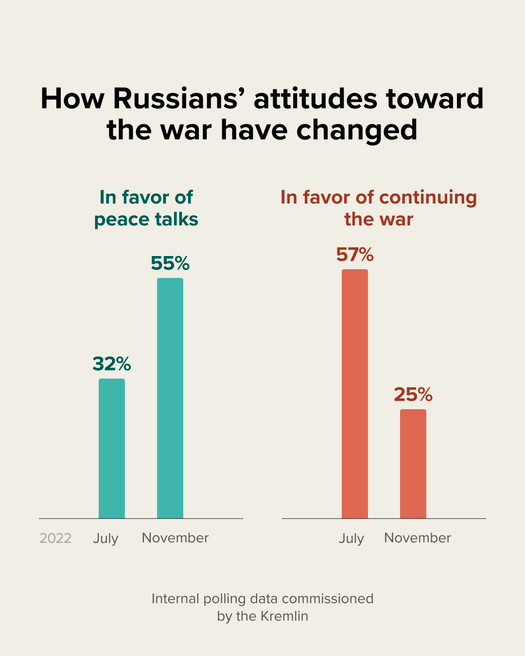
Make peace, not war The Kremlin’s internal polling shows that more than half of Russians now favor negotiations with Ukraine, while only a quarter want to continue the invasion
Мы рассказываем честно не только про войну. Скачайте приложение.
Article by Andrey Pertsev. Translation by Anna Razumnaya.
Russia’s ongoing military defeats in Ukraine and the social burden of mobilization are rapidly cooling the public’s support for the war. Meduza has gained access to the results of an opinion poll commissioned by the Kremlin “for internal use only.” According to the study conducted by the Federal Protective Service (FSO), 55 percent of Russians favor peace talks with Ukraine, while only a quarter of the respondents still support continuing the war.
The FSO poll does not diverge all that much from the results of an October public-opinion study conducted by the Levada Center, Russia’s only large independent sociological institute. In the Levada study, 57 percent of respondents said that they supported, or would probably support, peace talks with Ukraine. Only 27 percent expressed the same range of support for continuing the war.
The FSO’s own polling indicates that Russians’ attitudes about the war have changed. As late as July 2022, only 30 percent of survey respondents favored ending the war by peace negotiations. Comparing the new results to those collected in the summer make the shift obvious:

Two sources close to the Putin administration told Meduza that the Kremlin now plans to limit the polling data that VTsIOM (the Russian Public Opinion Research Center) releases to the public. One source said, “You can get all kinds of results these days — better not to do it at all.” Also speaking to Meduza, a political consultant who works frequently with the Kremlin explained that it’s “best not to reveal the dynamics” of the Russians’ changing attitudes towards the war.
Denis Volkov, the director of the Levada Center, says the share of Russians likely to support peace talks with Ukraine began to grow rapidly following Putin’s September 21 mobilization decree:
This is sheer reluctance to take part in the war personally. They continue to support it, but they have very little desire to participate themselves. Besides, their support was, from the very start, something they declared with regard to what they perceived as having nothing to do with themselves: “Life goes on — it’s even getting better.” Now, the risks are greater, and people want to start the talks. Still, the majority of people leave this to the government: “We’d like it, but it’s up to them to decide.”
Sociologist Grigory Yudin also links rising public support for peace talks to Russia’s draft. This fall, he says, Russians came face-to-face with the “crumbling of their everyday lives and a sense of danger.” Their “loss of faith in the victory” and the “absence of a convincing account of how exactly Russia might win” also contribute to the shift in opinions, says Yudin. “I wouldn’t be surprised,” Yudin added,
if this turned out to be mixed with an acute sense of danger to the country itself. In this sense, peace talks followed by legalizing the annexations should make the country safer.
Yudin says the public’s resentment for how the war is going is not far from outright “apathy.” Still, he doesn’t rule out the possibility of anti-war demonstrations in Russia:
Protests do not occur simply because people think something but because something makes protest possible. Russia’s protest potential is very high. When possibilities present themselves, there will be protests. Quite possibly, we won’t have to wait that long.
Kremlin insiders who spoke to Meduza, however, said there’s little concern in the administration about potential mass protests, though they acknowledged that “it’s best not to raise the temperature, and not to anger people if not necessary.” Russia’s state media and propaganda outlets, moreover, have already received instructions “not to dwell on the war.” According to Meduza’s sources, the mass media is now being told to focus instead on a “more positive agenda.”
Political scientist Vladimir Gelman says the dynamics of Russian public opinion are unlikely to pressure the Putin administration into honest negotiations with Ukraine. The Russian side, he argues, is “not ready to make concessions,” and the prospects of any peace talks depend largely on what happens in combat — not in opinion polls.
Last October, Meduza wrote about Vladimir Putin’s unwillingness to abandon his claim on the Ukrainian regions he’s now annexed outright. The Kremlin’s recent hints at possible peace talks are likely a scheme to buy time to prepare a new offensive. Meduza’s sources close to the administration say the president still clings to his plans in Ukraine, and officials will reportedly resume Russia’s “partial” mobilization in the winter. Just how many more men the Kremlin hopes to draft remains unclear.
Article by Andrey Pertsev. Translation by Anna Razumnaya.